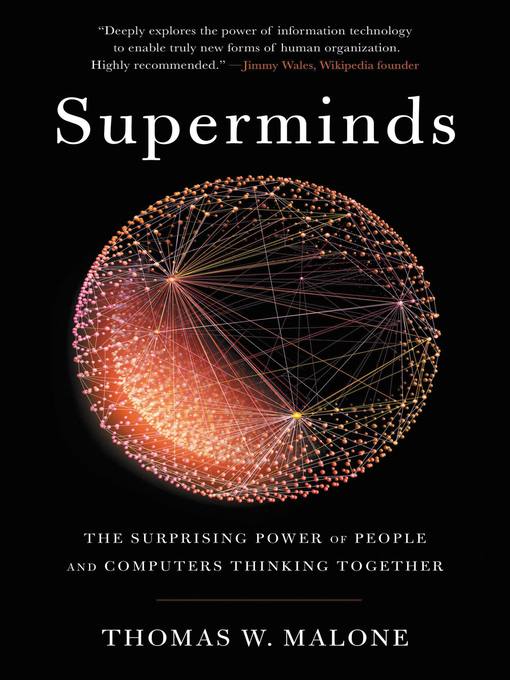If you're like most people, you probably believe that humans are the most intelligent animals on our planet. But there's another kind of entity that can be far smarter: groups of people. In this groundbreaking book, Thomas Malone, the founding director of the MIT Center for Collective Intelligence, shows how groups of people working together in superminds — like hierarchies, markets, democracies, and communities — have been responsible for almost all human achievements in business, government, science, and beyond. And these collectively intelligent human groups are about to get much smarter.
Using dozens of striking examples and case studies, Malone shows how computers can help create more intelligent superminds simply by connecting humans to one another in a variety of rich, new ways. And although it will probably happen more gradually than many people expect, artificially intelligent computers will amplify the power of these superminds by doing increasingly complex kinds of thinking. Together, these changes will have far-reaching implications for everything from the way we buy groceries and plan business strategies to how we respond to climate change, and even for democracy itself. By understanding how these collectively intelligent groups work, we can learn how to harness their genius to achieve our human goals.
Drawing on cutting-edge science and insights from a remarkable range of disciplines, Superminds articulates a bold — and utterly fascinating — picture of the future that will change the ways you work and live, both with other people and with computers.
-
Creators
-
Publisher
-
Release date
May 15, 2018 -
Formats
-
Kindle Book
-
OverDrive Read
- ISBN: 9780316349109
- File size: 4682 KB
-
EPUB ebook
- ISBN: 9780316349109
- File size: 5456 KB
-
-
Languages
- English
-
Reviews
-
Kirkus
March 15, 2018
Forget artificial intelligence. Instead, think collective intelligence, putting "AI in combination with humans who provide whatever skills and general intelligence the machines don't yet have themselves."It's not so much that the machines are going to supplant us, writes Malone (Management/MIT; The Future of Work, 2004), the director of the MIT Center for Collective Intelligence. It's that machines aren't quite capable--yet--of thinking in ways that humans do, just as machines can perform calculations that it would take generations of human thinkers to complete. Add IT to human brainpower, and you've got a supermind--with the operative notion being that the machines are aids to a collective of human thinkers who illustrate, in case after case, that "almost all of our important problems are solved by groups of people, rather than by individuals alone." While individual intelligence is important--and, writes Malone, intelligence tests are the best predictors of success in a broad range of human endeavors--it's the pulling together that's significant. Moreover, while smart people are certainly a desideratum, what counts more in powerful collective intelligence is "social perceptiveness," a matter in which women typically score higher than men. The author enumerates the cognitive processes that go into an intelligent system, including, importantly, the ability to learn from experience, which is perhaps not as widespread a talent as we might wish. That learning, in turn, may inspire platform revolutions. After all, Malone suggests, now that we're used to the ease of buying books and toothpaste online, why shouldn't we be able to shop for spinal surgery in the same way, so that "if consumers don't get what they want from their current doctors' offices, they're likely to go to other superminds in the market for medical services." The possibilities are endless.A book rich in speculation about how collective thinking might solve big problems such as climate change; of interests to fans of Daniel Dennett, Steven Pinker, and other big-picture thinkers.COPYRIGHT(2018) Kirkus Reviews, ALL RIGHTS RESERVED.
-
Library Journal
May 1, 2018
Malone (founding director, MIT Ctr. for Collective Intelligence; Patrick J. McGovern Professor of Management, MIT; The Future of Work) presents a captivating analysis of the remarkable capacity for intelligence exhibited by "superminds," or groups of people and computers working together. He defines superminds as individuals acting together in ways that seem intelligent, and collective intelligence as the property that any supermind has, or that arises when superminds collaborate. He reminds readers that the history of humanity is largely the history of human superminds, of how people together accomplished more than any individual could have done alone. He also details how crucial computers will be for the superminds of the future to perform the complex kinds of thinking that humans do today. Malone's lofty work, while rich in speculation, blends exciting new science, many years of research, and numerous case studies to predict a bold new world. It nicely complements Steven Pinker's Enlightenment Now, Daniel Coyle's The Culture Code, and Geoff Mulgan's Big Mind. VERDICT Essential for university libraries supporting graduate curriculum in psychology, political science, business, and computer science, and for erudite fans of social, emotional, and collective intelligence.--Dale Farris, Groves, TX
Copyright 2018 Library Journal, LLC Used with permission.
-
Formats
- Kindle Book
- OverDrive Read
- EPUB ebook
subjects
Languages
- English
Loading
Why is availability limited?
×Availability can change throughout the month based on the library's budget. You can still place a hold on the title, and your hold will be automatically filled as soon as the title is available again.
The Kindle Book format for this title is not supported on:
×Read-along ebook
×The OverDrive Read format of this ebook has professional narration that plays while you read in your browser. Learn more here.


